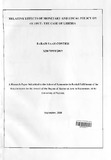| dc.description.abstract | The objective of this paper is to determine the relative potency of monetary and fiscal policy on output in Liberia for the period 1960 to 2008. In order to establish evidence on the relative potency of monetary and fiscal policy on output in Liberia, this study employs the St. Louis model which is estimated in the context of an unrestricted vector autoregression (VAR) framework. We computed impulse response functions (IRFs) and forecast error variance decomposition (FEVDs) using 1000 Monte Carlo simulations. Additionally, we estimated Granger causality amongst the variables contained in the model.
The results based on the IRFs and FEVDs provide empirical evidence in support of the hypothesis that monetary policy has a positive statistically significant impact on output in Liberia while fiscal policy is of no significance in altering output in Liberia. The findings of this study support the conclusions reached by proponents of the St. Louis Model who believe that monetary policy is relatively more effective in altering output than fiscal policy. The study found no evidence of the impact of a policy mix in altering output in Liberia. However, evidence of a foreign influence in altering output in Liberia was detected.
On the basis of the results, the following recommendations were made: that monetary policy should be the primary stabilization policy which must be complemented with fiscal discipline so as to achieve the desired policy objectives; that the conduct of monetary policy must be exercised with caution as regards the interest rate and the exchange rate so as to avoid inflationary expectations and attract foreign domestic investment; that efforts should be made to ensure an independent CBL that is free of political interferences and capable of instilling financial discipline in the banking sector; that the CBL formulate policies that are capable of protecting the interest of depositors thus discouraging the hoarding of currency, curbing capital flight and encouraging the development of organized and formal money and capital markets. | en_US |

